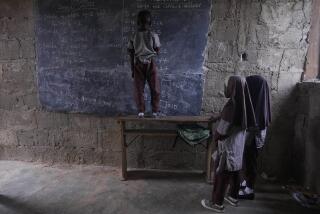Nigeria Feels Growing Pains of Democracy
- Share via
LAGOS, Nigeria — On a recent evening in this steamy city that rims a lagoon, about 80,000 fans poured into the streets after a soccer game. Some waved banners or chanted slogans to celebrate a victory in an Africawide tournament.
In such situations, emotions and frustrations tend to boil over in Nigeria’s bustling commercial capital, a traditional hotbed of opposition politics. But the atmosphere this time was elated but calm, a mood more typical of Nigerians since civilian rule was restored in May.
“There are skirmishes here and there, but any country going through change is bound to experience problems,” said Abdul Oroh, executive director of the Civil Liberties Organization, a local human rights group. “Generally, the atmosphere has improved. There is confidence. You see Nigerians laughing again.”
But religious and ethnic tensions, political unrest and economic hardship are threatening to undermine the satisfaction that sprang from a greater sense of personal freedom. And analysts warn that unless the government of President Olusegun Obasanjo can quickly guarantee measurable rewards--the expected dividends of democracy--disenchantment might quickly overrun a cautious feeling of contentment.
The freedom to vent frustrations already is taking a toll. Riots erupted recently in the predominantly Muslim northern state of Kaduna during protests by Christians about the proposed introduction there of Sharia, or Islamic law. Hundreds of people were killed, and revenge slayings followed in Nigeria’s southeast.
The north is mostly Muslim and ethnic Hausa-Fulani. The south is mainly populated by Yorubas and Ibos. Many in Lagos view the push to introduce Sharia as a reaction by northerners to the loss of the political power they’ve held for most of Nigeria’s 40 years of independence.
Obasanjo, a southerner and a Christian, became president last year. He says a decision has been reached to withdraw Sharia in the states where it was implemented, but it’s not clear that those states will follow through on that decision.
Years of Corruption Take Financial Toll
Improving the quality of life would help alleviate such religious and ethnic tensions. Despite Nigeria’s oil wealth, years of government mismanagement and corruption have left this nation in financial trouble. Critics say Obasanjo has yet to introduce the fundamental reforms needed to root out graft. Foreign investors express confidence but remain reluctant to make a commitment.
“The chief challenge is no longer civil and political liberties,” said Olisa Agbakoba, a prominent Lagos-based human rights lawyer. “The new challenge is economic and social rights, and how they can be more clearly defined.”
Obasanjo’s supporters say that since he took office, ending more than 15 years of domination by the military, the president has put Nigeria back on the path to recovery and is helping it shed a pariah image.
All political prisoners have been released. Arrests for making anti-government statements are increasingly rare. Long lines for gas, once the defining image of Nigeria’s demise, have disappeared. The president has launched an aggressive campaign against bribery, kickbacks and consumer scams; fired numerous army officers who had meddled in politics; and filed a formal application to the Swiss government to recover more than $2 billion frozen in bank accounts linked to the country’s late military dictator Sani Abacha.
“People are now seeing government as responsible,” said Tony Olu-Ikuenitiju, a media official at the Lagos headquarters of the ruling People’s Democratic Party. “Obasanjo is doing his best considering the enormous problems of the country.”
The government’s economic blueprint focuses on pursuing a market economy and privatization while reducing poverty through agricultural reforms and education. Securing debt relief also has been made a priority.
But basic reforms to improve living standards have yet to be undertaken. Supplies of water and electricity are still sporadic. Roads remain peppered with potholes and clogged with garbage. Many factories are idle, lacking the equipment and capital to operate. Unemployment is soaring and is rampant even among university graduates.
“The real impact [of the new government] on the ordinary people is yet to be felt,” said Pat Utomi, an economist at the prestigious Lagos Business School. “Nigeria must make an effort to leapfrog stages of development. Information, communication and technology must be brought home very quickly to everybody’s backyard to allow us to compete in the global economy.”
Official graft is still rife, detractors say. Government contracts are often awarded on the basis of political connections. There is huge waste in public expenditures, with much money being spent on the upkeep of public officials.
Clement Nwankwo, executive director of the Constitutional Rights Project, a local private organization, said the best houses in town are being rented for senior government officials, who also have access to huge fleets of cars. Their telephone bills are paid and household items and other provisions are provided. Nwankwo said unnecessary foreign trips by public officials also are becoming the norm.
Extortion, Dishonesty at Every Level
Obasanjo has established a panel to investigate government contracts awarded since 1976, has confiscated plots of land awarded to high-ranking military officials by Abacha’s regime, and has sent an anti-corruption bill to the National Assembly.
Among other things, the bill would allow authorities to tap telephones and examine bank accounts of public officials. The measure is still awaiting passage. Some human rights lawyers worry that the law could be misused against innocent citizens. Others doubt that parliament will pass it. In any case, they argue that it will take more than a firing or two to eliminate corruption.
“Heads have rolled, but new heads have stepped in and are not different [from] the heads on the floor,” Nwankwo said. “The reality of the corruption is so deep, that you don’t just need heads to roll.”
Nigeria needs reeducation in basic ethics because extortion and dishonesty have filtered into every layer of society, sociologists say. Street cops still demand bribes to waive traffic fines. Prison guards request lunch money, or more, before granting a lawyer permission to visit an inmate. Attorneys are frequently forced to pay a series of bribes to get their clients out of custody.
The court system is so inefficient that defendants, even in cases involving petty crimes, face months in jail before their cases are heard. “Dispensation of justice is slow, and the level of frustration is high,” Nwankwo said.
And people are free to vent their dissatisfaction about inefficiency, corruption and economic hardship, leading to more ethnic clashes.
Violence has erupted between the Odua People’s Congress, an ethnic Yoruba group, and rival Hausa organizations that are competing for land and business rights.
The government has reacted harshly to the fighting, blaming the OPC and ordering its members to be arrested or shot on sight. Obasanjo has also reacted ruthlessly to the recent slaying of 12 police officers in the Niger Delta town of Odi. He sent in troops to restore the peace, but instead, scores of innocent civilians were killed.
The government’s heavy-handed response damaged its credibility with human rights groups.
“What we have is a civilian government that still has the psychology of a military dictatorship,” said Segun Jegede, director of programs and projects at the Committee for the Defense of Human Rights. “Public servants are still autocratic.”
The administration’s policies on economics and regional autonomy are causing different problems. Tension has increased in the oil-producing delta region, where ethnic minorities are struggling for a bigger share of the profits. Legislation aimed at helping develop the backward region awaits Senate approval.
“People still don’t get the sense that the constitution addresses some of the key issues, like access to power, control of resources, decentralization,” Nwankwo said.
More to Read
Sign up for Essential California
The most important California stories and recommendations in your inbox every morning.
You may occasionally receive promotional content from the Los Angeles Times.










